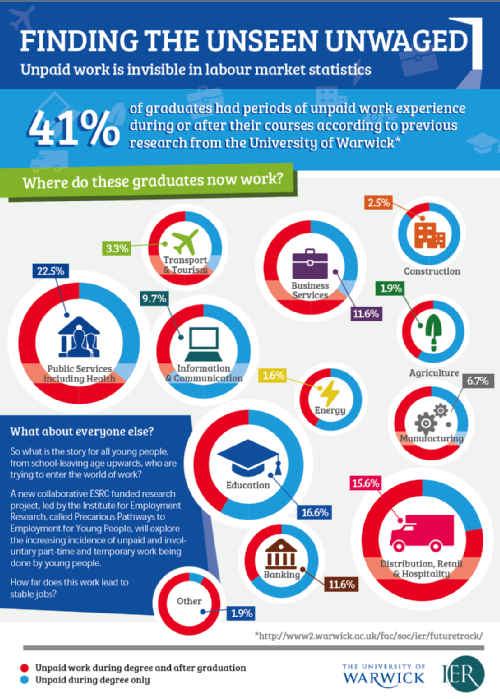IER News & blogs
Unpaid work could soon be the norm for all young jobseekers
Employment researchers predict unpaid work could soon become the norm for all young people trying to enter the job market.
A team of researchers from the universities of Warwick, Leicester, Aston and the Open University are about to start a large-scale project to look at the often ‘unstable and fragmented’ experiences of young people as they begin their careers.
Previous studies from IER revealed that 41% of graduates had taken on unpaid work experience during their course and after graduation. The public sector was shown to have the highest number of students and graduates who had done unpaid work (see Futuretrack).

The new project, called Precarious Pathways to Employment for Young People, will examine the experiences of all young people, not just graduates, from school leaving age upwards. The project is sponsored by the Economic and Social Research Council.
Project leader Professor Kate Purcell, from the University of Warwick’s Institute for Employment Research, said: “For increasing numbers of young people in the UK, the pathways into employment to work are unstable and fragmented. As employers demand evidence of 'employability skills', work placements and internships have become an integral part of secondary and higher education, and of early labour market experience. Unpaid, temporary and part-time work may soon become the norm for all young people as they start on their chosen career paths. Much of this activity is unrecorded in employment statistics. The increased early labour market experience of (often involuntary) temporary or part-time work that provides experience of employment but does not provide a living wage for young job-seekers, adds to the precarious picture of current youth access to opportunity.”
To find out more go to the Precarious Pathways project page.
Bernard Casey at the EC Demography Forum
The fourth Demography Forum, taking place on 6-7 May in Brussels, will focus on investing for Europe’s demographic future.
IER's Bernard Casey will act as Rapporteur on age and employment for the sesssion entitled "Enable people to be active longer".
Futuretrack Findings
Findings from Stage 4 of the HECSU-funded Futuretrack study are highlighted in a special issue of Graduate Market Trends (GMT), published by HECSU (February 2013). An IER research team, led by Professor Kate Purcell, followed the progression of the 2005/2006 cohort of applicants to higher education from application to graduation. Data from the Futuretrack study has raised important questions about the types of employment obtained by graduates, finances, career opportunities and further study.
http://www.hecsu.ac.uk/current_projects_graduate_market_trends.htm
Further details about the research can be found on the IER website at: www.warwick.ac.uk/futuretrack , where PDFs of the project’s published Reports and Working Papers can be accessed and downloaded, as can PDFs of the online questionnaires used for each stage of the longitudinal research.
, where PDFs of the project’s published Reports and Working Papers can be accessed and downloaded, as can PDFs of the online questionnaires used for each stage of the longitudinal research.
Professor Purcell notes: "This is the most ambitious and comprehensive research ever undertaken to explore the relationship between higher education and access to opportunity. The data we have collected is extraordinarily rich, the published reports produced so far only show the tip of the iceberg . There is much more to come..!”
Cedefop Publishes Forecasting Reports
Today sees the publication of two reports by Cedefop, the European Centre for the Development of Vocational Training. These reports are the latest in a series of publications from a 4-year skills demand and supply forecasting project led by IER’s Rob Wilson, working in collaboration with Cedefop and a consortium of partners across Europe.
The latest skill demand and supply forecasts produced for Cedefop aim to provide evidence on future labour market developments to help to make informed decisions. The main findings of the latest skill demand and supply forecast for the European Union for 2010-20 indicate that although the economic conditions will determine only a modest increase in job openings, current trends, including a shift to more skill-intensive jobs, a demand for people to be better qualified and more jobs in services, will continue.
produced for Cedefop aim to provide evidence on future labour market developments to help to make informed decisions. The main findings of the latest skill demand and supply forecast for the European Union for 2010-20 indicate that although the economic conditions will determine only a modest increase in job openings, current trends, including a shift to more skill-intensive jobs, a demand for people to be better qualified and more jobs in services, will continue.
The second publication provides an overview of the methodological framework used to underpin the skills forecasting project.
provides an overview of the methodological framework used to underpin the skills forecasting project.
Apprenticeships worth more to employers than they cost
Research by IER's Terence Hogarth and Lynn Gambin has been cited in the Richard Review, a report on the future of apprenticeships published by the Department for Business, Innovation and Skills. Work in this area, carried out by IER over the past 15 years, has demonstrated that apprenticeships are more beneficial to employers and employees than any other vocational training programme.
